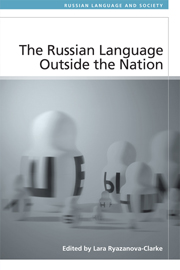Book contents
- Frontmatter
- Contents
- Notes on Contributors
- Cyrillic Transliteration System Adopted in the Book
- Introduction: The Russian Language, Challenged by Globalisation
- PART I Russian and Its Legal Status
- PART II Linguistic Perceptions and Symbolic Values
- PART III Russian-Speaking Communities and Identity Negotiations
- 5 Post-Soviet Russian-Speaking Diaspora in Italy: Results of a Sociolinguistic Survey
- 6 Ethnolinguistic Vitality and Acculturation Orientations of Russian Speakers in Estonia
- 7 Linguistic Performance of Russianness among Russian-Israeli Parents: Child-Raising Practices in the Immigrant Community
- PART IV Language Contact and the Globalisation of Russian
- PART V Globalisation of Russian as Soft Power
- Index
5 - Post-Soviet Russian-Speaking Diaspora in Italy: Results of a Sociolinguistic Survey
from PART III - Russian-Speaking Communities and Identity Negotiations
Published online by Cambridge University Press: 05 September 2014
- Frontmatter
- Contents
- Notes on Contributors
- Cyrillic Transliteration System Adopted in the Book
- Introduction: The Russian Language, Challenged by Globalisation
- PART I Russian and Its Legal Status
- PART II Linguistic Perceptions and Symbolic Values
- PART III Russian-Speaking Communities and Identity Negotiations
- 5 Post-Soviet Russian-Speaking Diaspora in Italy: Results of a Sociolinguistic Survey
- 6 Ethnolinguistic Vitality and Acculturation Orientations of Russian Speakers in Estonia
- 7 Linguistic Performance of Russianness among Russian-Israeli Parents: Child-Raising Practices in the Immigrant Community
- PART IV Language Contact and the Globalisation of Russian
- PART V Globalisation of Russian as Soft Power
- Index
Summary
INTRODUCTION
Although Russian travellers are known to have visited Italy from the fifteenth century, a significant migration process only dates back to the beginning of the twentieth. The first wave of Russian emigration was mainly represented by the noble classes and intelligentsia, making a great contribution to the spread of Russian culture in Italy.
Nowadays, representatives of the third generation of the first Russian emigration wave live all over Italy, but only a few continue to speak Russian. For instance, Maria Volkonskaya, one of the last descendants of the Volkonsky family of princes, lives in Rome, works as a translator and teaches Russian. In an interview, she admits that, for her generation, its Russian origins remain primarily in family memories. Despite the fact that for the first émigrés the Russian language was a precious resource for surviving, in Italy it was mainly limited to family life and this still seems relevant today.
The latest massive wave of migration can bring new hope to the Russian language, as in some countries like Israel, for example, it is represented more than it had been in the Soviet period, producing different contact processes. As Mechkovskaia (2004: 240) states, ‘in the modern world, the expansion and extension of school education, intensification of informational processes, as well as globalisation processes lead to the intensification of language contacts, which speeds up linguistic changes’.
- Type
- Chapter
- Information
- The Russian Language Outside the Nation , pp. 143 - 165Publisher: Edinburgh University PressPrint publication year: 2014



